
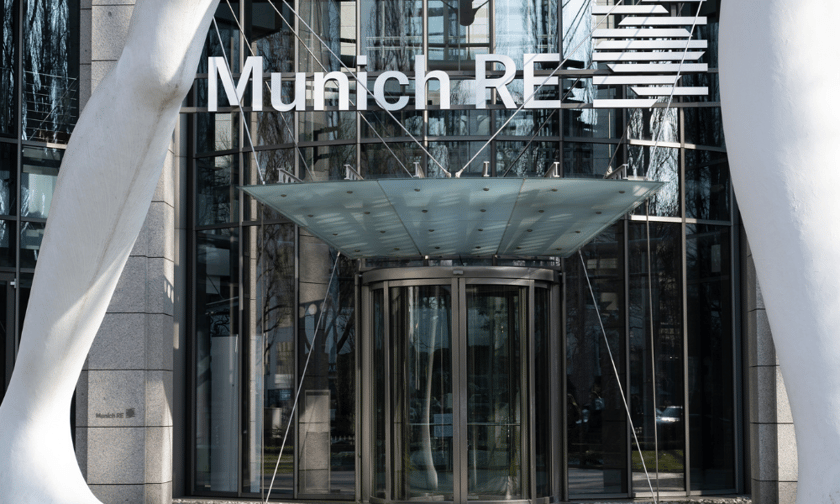
The global reinsurance market continues to grow, with the 50 largest reinsurance companies posting a combined $363.6 billion in gross premiums written (GPW), up 2.6% from the previous financial year. Of the total GPW, 70% were written by the top 10 industry players, with the two largest reinsurers controlling a quarter of the market, according to data gathered by AM Best.
In this article, Insurance Business takes a closer look at the world’s 10 biggest reinsurance companies based on the credit reporting agency’s latest market segment report. We will crunch the numbers to get a picture of each company’s business performance and compare this with that of the previous financial year. Check out the complete list below.
These are the companies that made the list of the top 10 reinsurers globally, according to AM Best’s latest industry report. The list is arranged by total GPW.
.png)
Headquarters: Munich, Germany
GPW: $51.3 billion
Non-life GPW: $36.7 billion
Life GPW: $14.6 billion
Munich Re remains at the top of the list of the world’s largest reinsurance companies, a spot it has held since 2020. The firm posted a 9.6% rise in GPW, up from $46.8 billion from the previous financial year. Munich Re accounted for 14% of the top 50’s entire premiums written in 2022.
The report attributed Munich Re’s strong performance to significant premium growth in its property and casualty (P&C) business, which increased 12.6%. The group’s life premiums also grew, although by a modest 2.6%. The company ranks third when it comes to GPW in the life and health segment.
Munich Re serves more than 4,000 clients in over 160 countries. Its primary insurance operations are concentrated within its subsidiary ERGO Group AG, which offers life, German health, and P&C coverage. Munich Re has more than 41,400 employees worldwide.

Headquarters: Zürich, Switzerland
GPW: $39.7 billion
Non-life GPW: $23.8 billion
Life GPW: $16.0 billion
Swiss Re registered modest growth of 2.7% in P&C premiums while its life and health premiums remained steady. It ranks third and second in terms of GPW in the respective segments. The company’s solid showing can be primarily attributed to reinsurance rate increases, which is notable given the euro’s depreciation.
Swiss Re and Munich Re control a huge portion of the market, accounting for a quarter of the entire GPW from the top 50 reinsurance companies.
Apart from reinsurance, Swiss Re owns several key businesses. These include:
Swiss Re also produces data-driven research alongside partner organizations through the Swiss Re Institute. The company has more than 14,700 employees globally.

Headquarters: Hanover, Germany
GPW: $35.5 billion
Non-life GPW: $25.9 billion
Life GPW: $9.6 billion
Hannover Re posted a 13% rise in premium volume to maintain the number three position in the list. Growth was driven by the reinsurer’s P&C segment, which climbed almost 19% year-on-year. AM Best’s report attributed the rise to “favorable pricing trends.”
Hannover Re’s GPW is the second highest among all companies in the P&C segment. Written premiums in its life and health business ranks sixth.
The group handles all lines of property, casualty, life, and health insurance. It holds offices in about two dozen cities worldwide and employs more than 3,500 staff.

Headquarters: Pennsylvania, USA
GPW: $23.4 billion
Non-life GPW: N/A
Life GPW: $23.4 billion
Canada Life Re’s GPW experienced a marginal decline of 0.5%, primarily due to the depreciation of the Canadian dollar. Despite this, the company maintains its hold of the fourth spot. The firm is one of the most notable risers in last year’s rankings, climbing all the way from eighth place to enter the upper half of the list for the first time.
Canada Life Re ranks number one in life premiums among all reinsurance companies on the list. According to its website, the group has more than $3 trillion in traditional, longevity, structured and non-life reinsurance policies in-force.

Headquarters: Nebraska, USA
GWP: $22.1 billion
Non-life GWP: $16.9 billion
Life GWP: $5.2 billion
Warren Buffet-owned Berkshire Hathaway climbs one notch to fifth place after registering an 11.8% rise in GPW. The jump, according to the report, can be partly attributed to its recent acquisition of the Alleghany Corporation. The transaction included Transatlantic Holdings, which was in 14th place last year with GPW worth $6 billion.
Berkshire Hathaway conducts its reinsurance business through several subsidiaries, including General Re and the Berkshire Hathaway Reinsurance Group. These reinsurance companies provide coverage for various property and casualty and life and health risks worldwide. Overall, the conglomerate’s insurance and reinsurance businesses are backed by more than 50,500 employees.

Headquarters: Paris, France
GPW: $21.1 billion
Non-life GPW: $10.7 billion
Life GPW: $10.4 billion
Despite a strong performance in the last financial year, SCOR slid one spot in the rankings. The company’s GPW grew 5.7%, with non-life and life premiums rising 14.8% and 2.3%, respectively. The group’s non-life segment posted among the largest increases in the list.
SCOR serves more than 4,000 clients worldwide. Its operations are backed by around 3,600 employees. The group has a presence in more than 30 countries.

Headquarters: London, United Kingdom
GWP: $18.5 billion
Non-life GWP: $18.5 billion
Life GWP: N/A
Lloyd’s experienced a slight decline in GPW, primarily due to the 10.1% depreciation of the British pound against the US dollar. However, the insurance marketplace maintains the seventh spot in the rankings. Lloyd’s reinsurance premiums come exclusively from its P&C business. It ranks fourth in the segment in terms of written premiums.
Lloyd’s conducts business through specialist syndicates. These syndicates price and underwrite risks through 200 registered Lloyd’s brokers and a global network of more than 4,000 UK coverholders.
Lloyd’s insures everything from national governments and multinational conglomerates to start-ups and small businesses. It operates in more than 200 countries and territories. Among its lines of business are aviation, cyber, crime, political risk, terrorism, financial institutions, and marine.
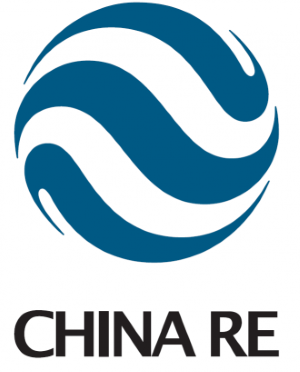
Headquarters: Beijing, China
GWP: $16.9 billion
Non-life GWP: $7.7 billion
Life GWP: $9.2 billion
China Re’s reinsurance GPW dipped by more than 5% year-on-year from $17.8 billion. Still, its position in the rankings remained stable, partly because of an almost 11% increase in non-life premiums.
China Re is the largest reinsurer in Asia and the only state-owned reinsurance group in China. It is also the first reinsurance company to be listed in the Hong Kong Stock Exchange.
China Re operates domestically, and in the US, the UK, Hong Kong, and Singapore. It has more than 51,000 employees globally.
.png)
Headquarters: Missouri, USA
GPW: $13.8 billion
Non-life GPW: N/A
Life GPW: $13.8 billion
A slight year-on-year increase from the $13.3 billion in GPW is enough for the Reinsurance Group of America (RGA) to maintain the ninth spot in the rankings. It caters exclusively to the life and health segment.
According to its website, the reinsurer has more than $3 trillion worth of policies in-force. Among the coverages it offers are accident, critical illness, disability income protection, and long-term care insurance. RGA has a 3,800-strong workforce.

Headquarters: Hamilton, Bermuda
GPW: $9.3 billion
Non-life GPW: $9.3 billion
Life GPW: N/A
Everest Re rounds up the list of the top 10 reinsurance companies in the world. The group’s GPW, consisting exclusively of P&C policies, increased 2.2% from $9.1 billion in the previous financial year. The company ranks seventh when it comes to P&C premiums.
Everest Re has a presence in more than 100 countries. Apart from reinsurance, it offers insurance products covering property and casualty, and life and health risks. The company has more than 2,400 employees globally.
AM Best noted that the rankings are designed to “isolate a reinsurer’s business profile” using gross premiums written.
To obtain the most accurate figures possible, the credit reporting agency disclosed that it made several “assumptions and adjustments” as it navigated through various financial statements, accounting standards, and segment reporting. It added that the most essential adjustment was “capturing only third-party business and excluding affiliated or intergroup reinsurance.”
AM Best also converted all reporting currencies to US dollars using the foreign exchange rate as of the date of the reinsurance companies’ financial statements. The agency noted that currency exchange rate fluctuations have a “meaningful effect” on the rankings.
When financial statements and supplemental data didn’t provide a proper breakdown of the premiums, AM Best obtained information directly from the reinsurers. The agency, however, cautioned that these figures might be unaudited.
Here’s a summary of the 10 largest reinsurance companies in the world.
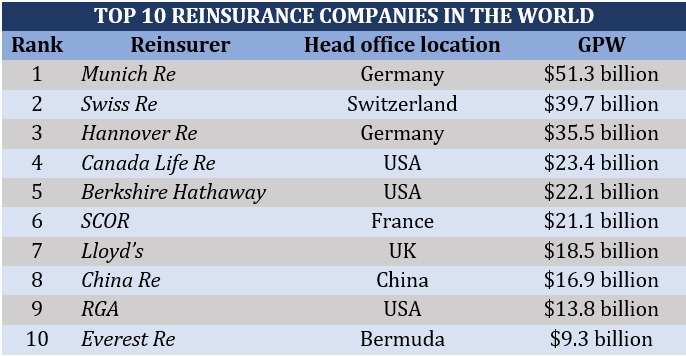
Here are the rankings of the world’s top 10 reinsurance companies broken down into the P&C and life and health segments.
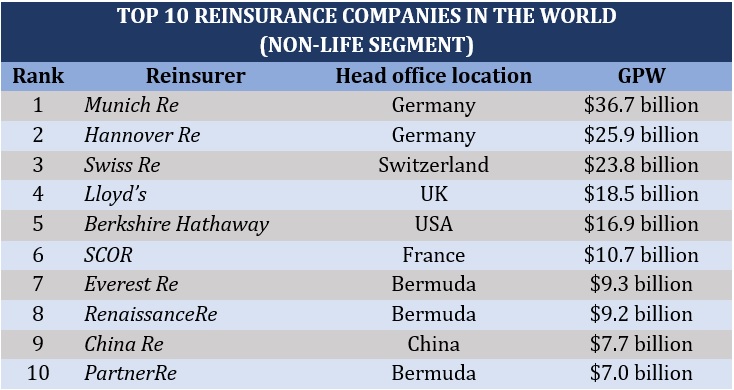
Top 10 reinsurance companies in the world – life & health segment
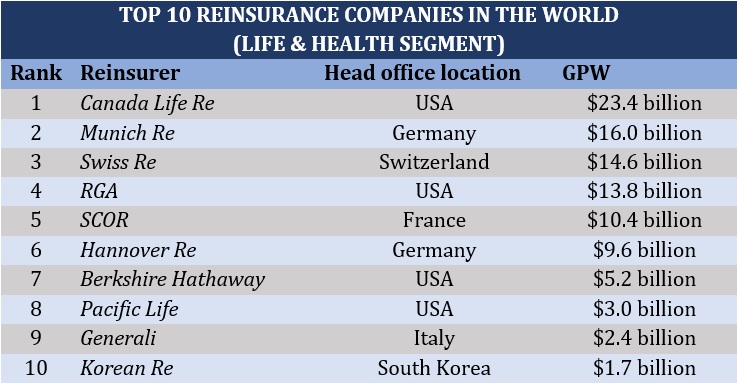
Often described as “insurance for insurance companies,” reinsurance serves as a form of financial cushion, allowing insurers to take on risks beyond what they’re willing to bear. This is exactly the type of protection reinsurance companies provide.
For many insurers, reinsurance also acts as an important financial tool, allowing them to manage risks and the amount of capital needed to assume these risks.
The National Association of Insurance Commissioners (NAIC) defines reinsurance as a contract between a reinsurer and an insurer. Under this arrangement, the insurance company – also referred to as the cedent or ceding company – transfers risk to the reinsurance company. The reinsurer then assumes a part or the entirety of one or multiple policies issued by the insurer.
According to the association, there are several reasons why insurance companies enter into an agreement with reinsurance companies. These include:
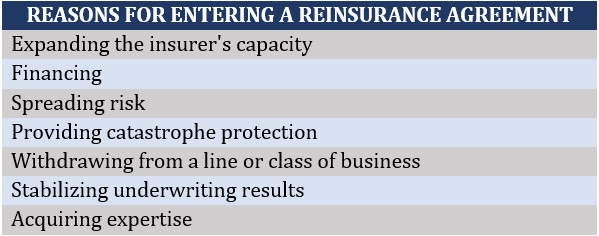
Just like insurance policies, reinsurance companies sell policies directly to insurers or distribute these through third-parties or intermediaries, aptly called reinsurance brokers.
Insurance companies, however, are not the only ones in need of reinsurance. Reinsurers also purchase reinsurance to avoid taking on too much risk in one location. This type of agreement is called retrocession.
Florida has a unique insurance market that is heavily reliant on reinsurance companies. This guide to reinsurance in Florida can help if you want to learn more about how the system works there.
The main difference between an insurer and a reinsurer is the type of clients they serve. Insurance companies provide financial protection to individuals, families, or businesses for certain kinds of risks.
Reinsurance companies operate the same way but provide coverage for insurance companies. They often act as a secondary insurer, assuming a portion or all the risk from the primary insurer.
Reinsurance comes in two types – facultative reinsurance and treaty reinsurance. If you want to know how each one works, feel free to check out our guide.
Our Best in Insurance Special Reports page is the place to go if you’re looking for reinsurance companies for your unique coverage needs. The companies featured in our special reports have been nominated by their peers and vetted by industry experts as respected and dependable market leaders.
By choosing to partner with these industry leaders, you can be sure that you’re going with a company that you can rely on during challenging times.
Have you experienced working with the reinsurance companies on the list? How was it? We’d love to see your story in the comments section below.
